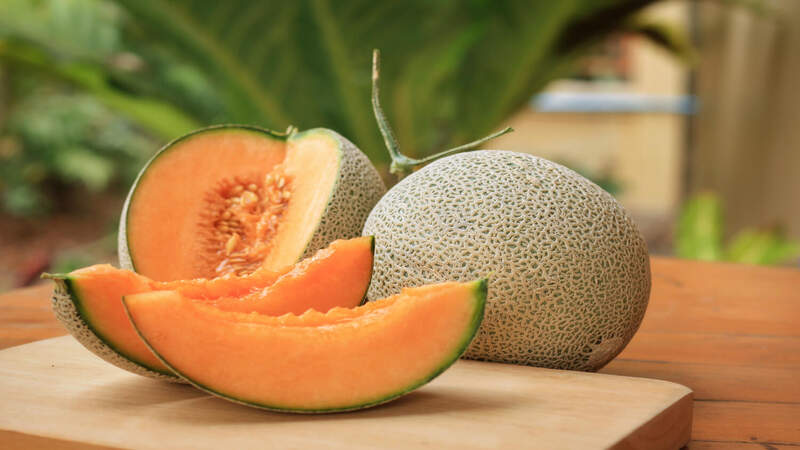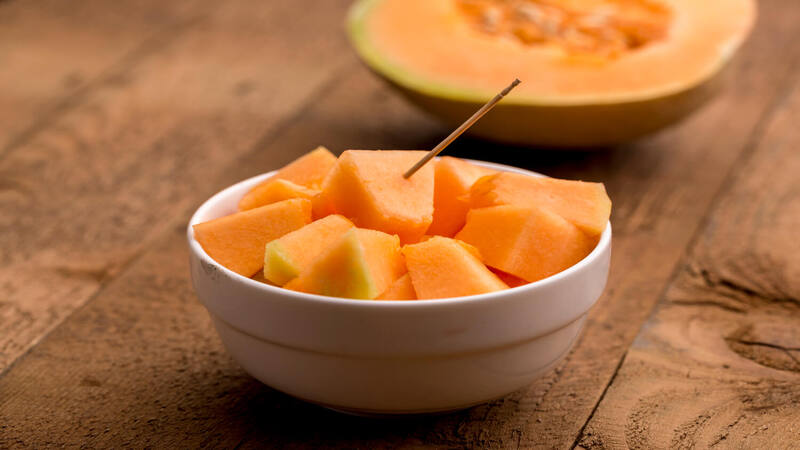
Pregnancy is a time when making healthy food choices is crucial for both the mother and the baby. Among the many beneficial fruits, cantaloupe (muskmelon) stands out as a nutritious and refreshing option. In India, these fruits are called KharbujaMuskmelon in pregnancy offers a wealth of vitamins, minerals, and hydration, making it a great addition to your diet.
Muskmelon is a vibrant superfood that offers a wealth of antioxidants, vitamins, and minerals, making it an excellent choice for expectant mothers. In this article, we’ll explore the benefits of eating muskmelon, aka cantaloupe, during pregnancy and the precautions you should consider when enjoying melons during pregnancy.
Is Muskmelon (Kharbuja) Good For Pregnancy?
Muskmelon is a beneficial choice during pregnancy when consumed in moderation. This delicious fruit is not only low in calories but also packed with essential nutrients such as iron, calcium, vitamin C, vitamin B1, etc. This makes cantaloupe a nourishing choice during pregnancy.
However, it is important to be aware of a few potential safety concerns associated with consuming cantaloupe during pregnancy. Sometimes, listeria bacteria can be present on the surface of these fruits. (1) If the fruit is not washed thoroughly, these harmful bacteria can enter the body. Listeria infections can bring about many pregnancy complications. (2).
Therefore, it’s important to clean muskmelons carefully under running water, removing any dirt or contaminants before consumption. Also, if you are allergic to muskmelon, do not eat it during pregnancy. Aside from that, muskmelon is safe and healthy to eat during pregnancy when consumed in moderation as part of a balanced diet.
Nutritional Values of Muskmelon
Muskmelon is packed with essential vitamins and minerals like iron, calcium, and phosphorus that are important during pregnancy. It is also an excellent source of folic acid.
Here is the nutritional value of 100 grams of muskmelon (3):
| Nutrient | Amount | Unit |
|---|---|---|
| Water | 90.2 | g |
| Energy | 34 | kcal |
| Energy | 141 | kJ |
| Protein | 0.84 | g |
| Total lipid (fat) | 0.19 | g |
| Carbohydrate, by difference | 8.16 | g |
| Fiber, total dietary | 0.9 | g |
| Total Sugars | 7.86 | g |
| Calcium, Ca | 9 | mg |
| Iron, Fe | 0.21 | mg |
| Magnesium, Mg | 12 | mg |
| Phosphorus, P | 15 | mg |
| Potassium, K | 267 | mg |
| Sodium, Na | 16 | mg |
| Zinc, Zn | 0.18 | mg |
| Copper, Cu | 0.041 | mg |
| Manganese, Mn | 0.041 | mg |
| Selenium, Se | 0.4 | µg |
| Vitamin C, total ascorbic acid | 36.7 | mg |
| Thiamin | 0.041 | mg |
| Riboflavin | 0.019 | mg |
| Niacin | 0.734 | mg |
| Pantothenic acid | 0.105 | mg |
| Vitamin B | 60.072 | mg |
| Folate, total | 21 | µg |
Top 10 Benefits of Eating Cantaloupe During Pregnancy

Cantaloupes, or muskmelons, are an excellent summer fruit for pregnant women. They are rich in water, minerals, and vitamins, helping to maintain fluid balance and prevent electrolyte loss while also providing a cooling effect to manage body heat.
Here are some key muskmelon benefits in pregnancy:
1. Offers Relief From Constipation
Constipation is a recurrent issue in the course of pregnancy. Eating musk melon during pregnancy can help prevent constipation. It is rich in water and fiber, both of which play essential roles in promoting healthy digestion and regular bowel movements
2. Helps to Boost Immunity
During pregnancy, a woman’s immune system changes, and maintaining a strong immune response is important to protect both the mother and the developing baby. Musk melon (cantaloupe) can help improve immunity during pregnancy in several ways.
- Musk melon is an excellent source of vitamin C, which plays a crucial role in boosting the immune system.
- The melon is packed with antioxidants that help neutralize harmful free radicals in the body, reducing inflammation and supporting overall immune function.
- Musk melon also contains beta-carotene, which the body converts into vitamin A. Vitamin A supports the skin’s health and mucous membranes, which act as the body’s first line of defense against pathogens.
3. Provides Relief From Morning Sickness
Cantaloupe is a refreshing and nutritious fruit that boasts an abundance of B complex vitamins, including B1 (thiamine), B3, B5, and B6. Vitamin B1, in particular, plays a crucial role in managing morning sickness, a common challenge faced by many pregnant women during the first trimester.
4. Helps in Regulating Blood Pressure
During pregnancy, many mothers may develop high blood pressure, which can lead to complications. Muskmelon contains a beneficial mix of essential minerals that help regulate blood pressure and manage hypertension effectively.
5. Helps in Preventing Blood Clots
Anticoagulants are the blood thinners that keep the blood from clotting. The blood clot formation during pregnancy increases the danger of stroke, heart attack, and kidney failure in expecting mothers. One of the key components in muskmelon is adenosine, a compound with blood-thinning properties (4). While blood clot formation during pregnancy is rare, consuming muskmelon can help thin the blood and reduce the risk of such clots.
6. Good For Overweight Pregnant Woman
Being overweight during pregnancy can lead to problems such as premature delivery, miscarriage, and high blood pressure. It is very important to consume essential nutrients. Muskmelon is a good choice for pregnant women because it is free of fat and cholesterol, meaning it has very few calories. Cantaloupe also provides many essential nutrients, minerals, and vitamins that are important during pregnancy.
[Read : Gestational Hypertension During Pregnancy]
7. Prevents Baby From Birth Defects
The baby’s neural tube, which eventually develops into the brain and spinal cord, is formed during the first trimester. Folic acid, a form of folate, is crucial for the healthy development of the neural tube. (5) Cantaloupe has a good amount of folic acid. Thus, including kharbuja in a pregnancy diet may help to prevent neural tube defects in the fetus.
8. Helps in Post-Partum Recovery
A mother’s body needs sufficient nutrition to recover after delivery. The vitamin A found in muskmelons, when consumed during pregnancy, is stored in the liver and significantly contributes to the recovery process for new mothers.
9. Helps to Prevent Pregnancy Anaemia
Pregnant women are at an increased risk of anemia. During pregnancy, the body needs more iron to support the increased blood volume and to provide oxygen to the growing fetus. (6) As the pregnancy progresses, the demand for iron increases, which can deplete a woman’s iron stores, especially if her diet is not iron-rich.
Musk melon can help in preventing anemia during pregnancy, but it’s important to understand that it does so indirectly. Musk melon is an excellent source of vitamin C, which plays a key role in improving the absorption of non-heme iron – the type of iron found in plant-based foods.
10. Facilitates The Development of the Baby’s Eyesight
Pregnant women require additional vitamin A for fetal development, tissue maintenance, and metabolic support. (7). Also, a baby’s eyes start developing in the first trimester of pregnancy and are fully formed by the end of the pregnancy. It is found that preterm infants with vitamin A deficiency have a higher risk of eye and chronic lung diseases. (8) Consuming foods high in vitamin A, such as muskmelon, can significantly reduce the risk of eye problems for the baby, improving future eyesight. (8a).
[Read: Know Everything About Your Baby’s Skull, Skeleton, and Bones Development]
Why Are Cantaloupes Tagged as ‘Food to Keep Away From During Pregnancy’?

Muskmelon is a healthy fruit packed with essential vitamins and minerals for pregnancy. However, if labeled with a warning to “keep away while pregnant,” it concerns contamination rather than the fruit itself.
In 2011, a Listeria outbreak in the U.S. was traced back to muskmelons contaminated with Listeria monocytogenes. The bacteria can be found on the fruit’s skin and can enter when the fruit is cut, leading to infections. Thus, it was advised that pregnant individuals avoid muskmelon as a safety measure.
Muskmelon in Pregnancy: How Much Is Safe Per Day?
Muskmelon is a nutritious and delicious fruit that can be safely enjoyed during pregnancy. However, like all foods, moderation is key. One cup (about 150g) of chopped muskmelon a day is generally safe for most pregnant women. However, consult your healthcare provider if you have dietary restrictions or gestational diabetes. For a more balanced diet, consider pairing muskmelon with other healthy fruits to ensure your body receives a wide range of essential nutrients throughout your pregnancy.
Precautions While Eating Muskmelon in Pregnancy
Muskmelon isn’t just a sweet and refreshing treat—it’s also loaded with vital nutrients that can support a healthy pregnancy. However, to make the most of its benefits while keeping things safe for both you and your baby, it’s important to follow a few simple precautions when enjoying this delicious fruit.
1. Make sure the fruit is out of contamination
By going through the following safety measures, the melon can be kept out of contamination:
- Prior to cutting, eating, or cooking the melon, wash it thoroughly. First, immerse it in a vinegar-water solution and then wash it under running water.
- Use a scrub brush to wash the melon while holding it under the running water.
- Use a clean cloth to dry the fruit.
- Wash hands, knives, countertops, and cutting boards thoroughly.
- Now you can start cutting the melon.
2. Be mindful of allergies
If you’re allergic or sensitive to melons, consult your doctor before eating muskmelon.
3. Pick ripe fruits
Stick to ripe muskmelons, as unripe ones can lead to bloating, gas, and other digestive issues.
4. Watch sugar intake
While muskmelon’s natural sugars are generally safe during pregnancy, those with gestational diabetes should keep an eye on portion sizes.
Therefore, as long as you’re not allergic to it and the cantaloupe is properly cleaned, eating it during pregnancy poses no risk.
FAQ’s
1. Is It Safe To Eat Muskmelon In The First Trimester?
Absolutely. Muskmelon can be safely consumed throughout all stages of pregnancy, including the first trimester, as long as it’s properly cleaned and eaten in moderation.
2. Are There Any Fruits I Should Avoid Mixing With Muskmelon During Pregnancy?
There’s no strong evidence against mixing muskmelon with other fruits, but combining it with acidic fruits like citrus or sour berries may cause mild indigestion in some people.
3. How Should I Store Muskmelon?
Store whole muskmelons at room temperature. Once cut, keep them in an airtight container in the refrigerator and consume within 2–3 days.
4. What’s The Best Way to Eat Muskmelon?
You can enjoy it fresh as cubes or slices, add it to salads, smoothies, or even blend it into a refreshing juice.
Read Also: 10 Benefits Of Watermelon During Pregnancy
References
- Dumitru Macarisin, Anna Wooten, Antonio De Jesus, Minji Hur, Seonjae Bae, Jitendra Patel, Peter Evans, Eric Brown, Thomas Hammack, Yi Chen, Internalization of Listeria monocytogenes in cantaloupes during dump tank washing and hydrocooling, International Journal of Food Microbiology, Volume 257,2017, Pages 165-175 – https://www.sciencedirect.com/science/article/pii/S0168160517302866
- Janakiraman V. Listeriosis in pregnancy: diagnosis, treatment, and prevention. Rev Obstet Gynecol – https://pmc.ncbi.nlm.nih.gov/articles/PMC2621056/
- U.S. Department of Agriculture, Agricultural Research Service – https://fdc.nal.usda.gov/food-details/169092/nutrients
- A Review on Musk Melon, Deepak Dhami, Lovely Professional University – https://ijcrt.org/papers/IJCRT2105194.pdf
- Obrycki JF, Lee JJ, Kapur K, Paul L, Hasan MOSI, Mia S, Quamruzzaman Q, Christiani DC, Mazumdar M. A case-control analysis of maternal diet and risk of neural tube defects in Bangladesh. Birth Defects Res. 2019 Aug 15;111(14):967-981. – https://pmc.ncbi.nlm.nih.gov/articles/PMC6703921/
- Institute of Medicine (US) Committee on Nutritional Status During Pregnancy and Lactation. Nutrition During Pregnancy: Part I Weight Gain: Part II Nutrient Supplements. Washington (DC): National Academies Press (US); 1990. 14, Iron Nutrition During Pregnancy. – https://www.ncbi.nlm.nih.gov/books/NBK235217/
- McCauley ME, van den Broek N, Dou L, Othman M. Vitamin A supplementation during pregnancy for maternal and newborn outcomes. Cochrane Database Syst Rev. 2015 Oct 27;2015(10) – https://pmc.ncbi.nlm.nih.gov/articles/PMC7173731/
- National Institutes of Health, Division of Program Coordination, Planning, and Strategic Initiatives, Vitamin A and Carotenoids – https://ods.od.nih.gov/factsheets/VitaminA-HealthProfessional/

